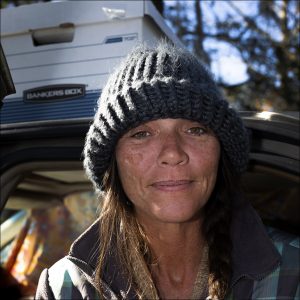By Edysmar Diaz-Cruz
Published July 20, 2020

GAINESVILLE, Fla. — When Jennifer Pytlik wraps herself with layers of blankets in the backseat of her car, she closes her eyes and imagines a life in which she is no longer homeless.
In this life, she gets to take her granddaughters, Elise and Adaline, to the playground and watches them laugh and run carelessly, as children do. She gets to learn how to play the piano alongside them. And when the girls grow into teenagers, they come to Pytlik for advice on boys.
But then Pytlik opens her eyes. And reality sets in.
Her days begin in her 20-year-old gold Nissan Altima, parked in a lot at Dignity Village. The tires are deflated and the engine refuses to sputter back to life. The stagnant seats hold the last of Jennifer’s possessions — neatly folded clothes, family albums and a collection of self-help books. The car anchors her to what she sees as purgatory on Earth.
“The people here love drugs and drama,” she says. “I just want to get out.”
At 49, this is what her life has come to.
Every night, she fears thieves who lurk in the dark, slashing neighboring tents and disappearing with what little everyone owns in this tent city. She can hear them rustling outside her car window.
She once watched a woman who had been homeless longer than herself reach a breaking point after consecutive nights of looting. At the sight of her dwindling pile of clothes, which she hid under a black tarp, the woman threw herself onto the remaining heap and cried. She swore to anyone who cared to listen that the thieves would pay for taking what little she had left.
The woman screamed and shook her fists at God. “All I do is give, give, give,” Pytlik heard her say. “And what do I get? They take, take, take. I’m ready to walk out on this life.”
Pytlik watched the woman from her car, 5 feet away. She couldn’t bear the sight of her suffering.
“No, honey, you don’t want to do that,” she told her. “Don’t take the easy way out.”
Every night, Pytlik locks her Nissan and hopes for the best. She turns to her stuffed hippopotamus. She runs a blue comb through the fake fur. It helps calm her nerves.
“It gives me something else to do with my hands besides smoking,” she says of her daily half-pack of Marlboros.
Besides, the toy hippo reminded her of Leo, the cat she left behind in Milwaukee before moving to Gainesville nearly two years ago to be close to her only daughter. She found a job as a housekeeper for a married couple. In exchange for her cleaning services, Pytlik was able to live in the couple’s guest house for several months.
But then the pain from a previous factory job injury returned and got in the way of her work. She was let go. She packed her belongings and ended up at the GRACE Marketplace shelter, where she hoped to take a cold shower and enjoy a free meal.
But it was hard to sleep amid the chaos in the shelter dorms. Then her car engine blew out on the way back from a trip to a nearby convenience store. And her phone was stolen. She lost contact with her daughter.
“I miss being a productive member of society,” Pytlik says. “For most of my life, I was going to work, I was making things happen. I was earning a paycheck. When I needed things, I could go shopping. When my muffler broke, I could go to the mechanic and fix it.”
Pytlik now has to panhandle to afford simple luxuries from her past life, like an occasional Diet Coke. She spends hours standing on a traffic median as cars zoom past her. On average, she makes $8.
“It smells, it’s loud and it’s degrading, but I refuse to sell my body,” she says.
Still, she managed to establish slivers of normalcy in her life as a homeless woman. She tends to a flourishing 2-by-6-foot plot of land in a community garden, behind the shelter cafeteria. On sunny days, she puts on her maroon sunglasses, throws her purse over her shoulder and checks on her jalapeños and tomatoes.
“It’s a place for me to feel like myself again,” she says, “and enjoy some of the things that I love about myself.”
She dedicates hours to pulling out weeds that invade her garden. The fence that separates it from the tent city blocks her view of the place where she is forced to live. The only hint is the smoke from campfires rising to the sky. Here, in her garden, she feels most like the woman she used to be.





